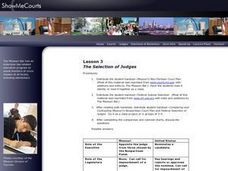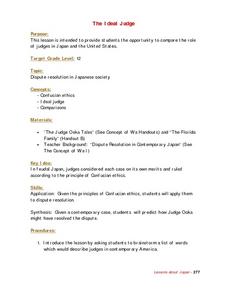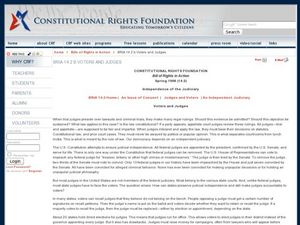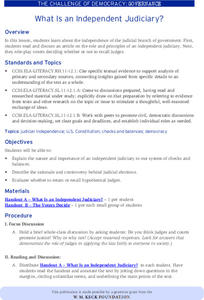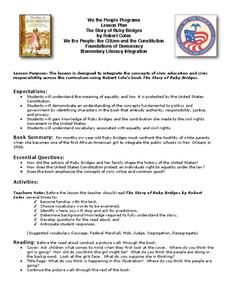Curated OER
The Selection of Judges
Students analyze documents to determine the steps taken in the selection of judges.
Curated OER
The Ideal Judge
Twelfth graders compare and contrast judges in Japan and United States, read cases from "The Judge Ooka Tales," apply principles of Confucian ethics to dispute resolution, and predict how Japanese judge would rule in contemporary case.
Curated OER
What Makes a Good Judge?
Young scholars define qualities that should be considered when selecting judge, evaluate costs and benefits of two methods of selecting and retaining judges, decide whether methods provide for judicial independence
and judicial...
Curated OER
Voters and Judges
Students analyze the work on independent judiciaries. In this federal courts lesson, students listen to their instructor lecture on details of federal cases. Students respond to discussion questions and participate in an activity...
Curated OER
Character Profile
Students exemplify non-stereotypical behavior. In this character education lesson, students read Pink and Say and discuss the negative effects of judging people on superficial characteristics. Students fill in a chart how they felt about...
Curated OER
Pen Pals
Students write to a pen pal and learn about their lives. In this pen pal instructional activity, students learn about a person from another country. Students develop an understanding that they have many things in common with people from...
Curated OER
A Critical Look at Aboriginal Art
Students observe art from different Aboriginal cultures. In this art evaluation lesson, students discover the different traditions of cultures from the Pacific North West. Students judge the art from these cultures with a specific...
Advocates for Human Rights
Mock Immigration Court
As part of a unit study of immigration, class members participate in a mock Immigration Court activity in which they argue four cases before an immigration judge.
Judicial Learning Center
Judicial Independence
Most people support the idea of an independent judiciary in theory until they hear about a court case that violates their principles. An informative resource explains why the concept is important. It also provides scholars of criminology...
Judicial Learning Center
Your 4th Amendment Rights
Americans love to learn about their rights, especially those that protect them from the government's power to invade their privacy. Young people are especially engaged by this topic. An informative lesson explores four Supreme Court...
Judicial Learning Center
The Players in the Courtroom
Courtrooms are complicated. In addition to the many rules, there are a number of people whose jobs are not very clear to the casual courtroom observer. With the resource, individuals identify some of these roles and review more...
Judicial Learning Center
Your Day in Court
Whether out of choice or necessity, people want to know what will happen on a typical day in court. A helpful lesson walks scholars in the field of criminology through the trial process from opening statements to the final verdict.
Heritage Foundation
Courts and Judges
If the Supreme Court is so supreme, why do all cases not just start there? High schoolers learn why every case does not start at the Supreme Court as well as the importance of hierarchy in the US judicial system in the 11th installment...
Curated OER
The Voice of Voting: How do We Judge Design
Students examine various methods of judging popular culture and compare them to the judging of the People's Design Award. In this popular culture and design instructional activity, students research different ways of voting in popular...
Constitutional Rights Foundation
What Is an Independent Judiciary?
While justice is supposed to be blind, it doesn't always follow the rules. Using a reading on the independent judiciary and case studies, learners consider what to do with judges who rule in their own self-interest rather than on behalf...
Curated OER
We the People: The Citizen and the Constitution
Robert Coles’ The Story of Ruby Bridges forms the basis of this powerful cross-curricular study of civic education and civic responsibility. Class members consider how the book presents authority, responsibility, justice, and privacy.....
State Bar of Texas
Hernandez v. Texas
What if the jury is not made up of people from your ethnicity or background—are they still considered your peers? Scholars analyze the impact the Supreme Court case Hernandez v. Texas had on jury selection across the nation. Paired...
Curated OER
Jay Chou: Famous People (ELL Assignment)
This 13-page assignment was designed for English language learners and includes a one-page reading on the Taiwanese entertainer, Jay Chou, and 10 activities/exercises that address listening and reading comprehension, speaking, vocabulary...
Curated OER
Executive Decisions
Students explore the role of judges in Britain. In this current events lesson, students visit selected websites to discover the responsibilities of judges and the justice reform in Britain.
Curated OER
Selecting Judges: Playground Bullying - Judicial Fairness
Pupils discuss behavior. In this judging fairness instructional activity, students discover how there are different perceptions on what is the most fair way to solve a situation. They work in small groups and as a class to role play and...
Curated OER
Judges in the Classroom Lesson Plan History Of The Bill Of Rights
Learners study the US Constitution, The Bill of Rights, and other amendments. They investigate the people who obtained the Bill of Rights and play a game based on their studies.
Digital Wish
I See Lots of People
A straightforward digital photography lesson that is a practice in cloning. Learners take a photograph of an individual and then a group of classmates. They insert the individual several times in the picture to make it look like several...
Curated OER
World War I: People, Places, and Events
Students research the people, places, and events of World War I. They select a topic, conduct research, read and discuss a bibliography handout, and create a biography, newspaper, diorama, or comparative maps to present their research...
Curated OER
Everybody Is Unique: A Lesson in Respect for Others' Differences
Learners of all ages talk about the meaning of the word "unique," and draw a truly unique person, one part at a time. They create a totally unique person, with a head drawn by one student, a torso drawn by another student, and lower body...


